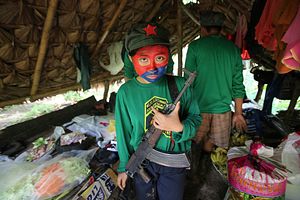Philippine communist guerrillas marked the 50th anniversary of their rural rebellion on Friday with threats of more attacks, possibly in cities, as a negotiated settlement remains elusive and peace talks have repeatedly stalled.
The New People’s Army marked a half a century after its founding with an attack on a police patrol in northern Mountain Province that killed a policeman. Authorities said a separate rebel assault on a police station in eastern Victoria town backfired Thursday when officers fought back and killed three insurgents and captured three others.
Regional rebel spokesman Magno Udiao said the insurgents targeted about 20 policemen patrolling the hinterlands in the mountainous region because they were conducting counterinsurgency tasks with the military.
In light of the government’s withdrawal from peace negotiations, the rebels “will incessantly mount tactical offensives to continue the NPA’s mandate of seizing political power from the corrupt and fascist ruling classes and dismantling its fascist machinery,” Udiao said.
The Maoist rebels have negotiated unsuccessfully with five Philippine presidents before current leader Rodrigo Duterte. The rebel force had only about 60 fighters, nine automatic rifles, and 26 single-shot rifles and pistols when it was established in 1969, and gradually grew and expanded across the impoverished nation.
Battle setbacks, surrenders, and infighting, however, have weakened the guerrilla group, which is considered a terrorist organization by the United States and remains a major Philippine security threat. The communist rebellion has left about 40,000 combatants and civilians dead. It also has stunted economic development, especially in the countryside, where the military says about 3,500 insurgents are still active.
Initially upbeat negotiations under Duterte, who calls himself a socialist, gradually unraveled as he protested continued insurgent attacks on government forces and the guerrillas accused troops of violating the government’s own ceasefire by continuing combat operations in what they said were their rural strongholds. Duterte and the rebels eventually lifted their ceasefires, sparking new violence.
In 2017, Duterte signed a proclamation terminating peace negotiations with the guerrillas brokered by Norway just a year after he became president in mid-2016 and pursued talks with the guerrillas. Although he indicates from time to time that he is still open to returning to the negotiating table, Duterte dismantled his negotiating panel last week.
Amid the collapse of talks, the violence and war of words raged on.
“Duterte is the face of the rottenness of the entire ruling system. His anti-people, anti-national and anti-democratic policies are causing the people grave social and economic hardships,” the Communist Party of the Philippines said in a statement it issued to praise and call on its armed wing to press its insurgency, one of Asia’s longest-running.
“We must strengthen the New People’s Army several times over and raise its capability in annihilating enemy units,” the communist party said. “The NPA must target the worst fascist criminals, punish them for their abuses and smash their culture of impunity. We must also carry out partisan operations in order to punish the enemy in the cities and in their main lines of communication and transportation.”
Last year, more than 380 government security personnel perished in rebel attacks, it said.
Security officials, however, have played down such rebel threats as propaganda from what they call a spent force of “criminals and terrorists.”
The Department of National Defense said that “for five long decades, the NPA stained our soil with blood, extorted from our hard working people, harassed our communities, and tore Filipino families apart.”
With Duterte forming in December a “National Task Force to End Local Communist Armed Conflict” which he heads, the defense department vowed that New People’s Army insurgents will become “strategically irrelevant by 2022,” the year Duterte’s six-year term ends.
“We will make sure that they will be defeated at every turn,” the defense department said in a pledge that officials under previous presidents have also made.
By Jim Gomez for The Associated Press.

































